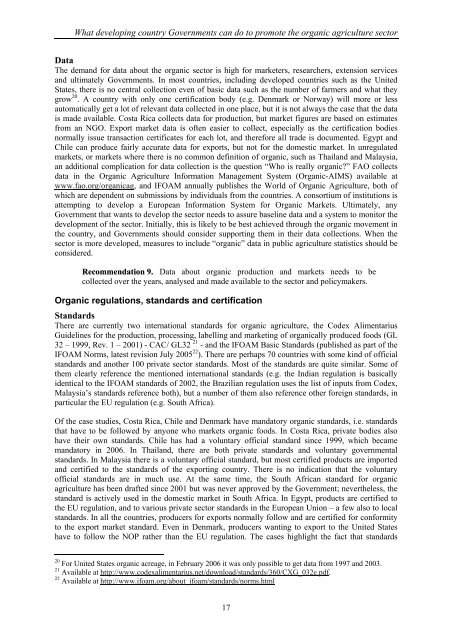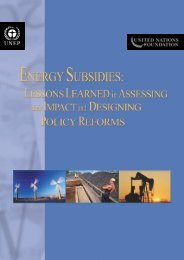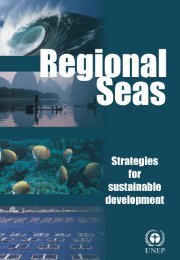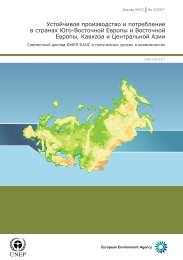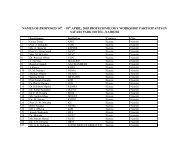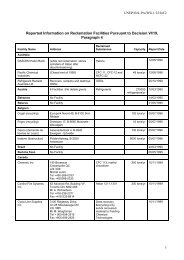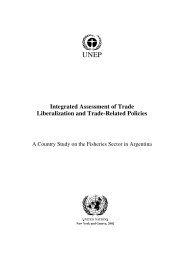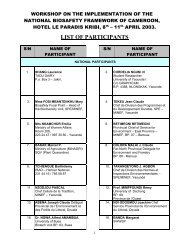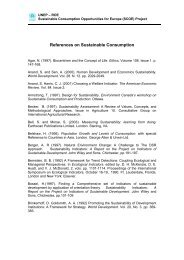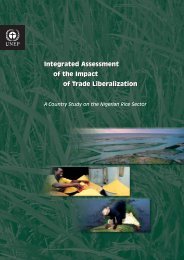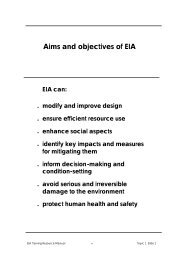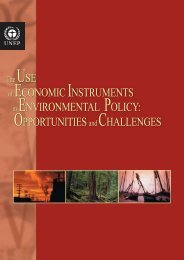Best Practices for Organic Policy - What developing country - UNEP
Best Practices for Organic Policy - What developing country - UNEP
Best Practices for Organic Policy - What developing country - UNEP
You also want an ePaper? Increase the reach of your titles
YUMPU automatically turns print PDFs into web optimized ePapers that Google loves.
<strong>What</strong> <strong>developing</strong> <strong>country</strong> Governments can do to promote the organic agriculture sector<br />
Data<br />
The demand <strong>for</strong> data about the organic sector is high <strong>for</strong> marketers, researchers, extension services<br />
and ultimately Governments. In most countries, including developed countries such as the United<br />
States, there is no central collection even of basic data such as the number of farmers and what they<br />
grow 20 . A <strong>country</strong> with only one certification body (e.g. Denmark or Norway) will more or less<br />
automatically get a lot of relevant data collected in one place, but it is not always the case that the data<br />
is made available. Costa Rica collects data <strong>for</strong> production, but market figures are based on estimates<br />
from an NGO. Export market data is often easier to collect, especially as the certification bodies<br />
normally issue transaction certificates <strong>for</strong> each lot, and there<strong>for</strong>e all trade is documented. Egypt and<br />
Chile can produce fairly accurate data <strong>for</strong> exports, but not <strong>for</strong> the domestic market. In unregulated<br />
markets, or markets where there is no common definition of organic, such as Thailand and Malaysia,<br />
an additional complication <strong>for</strong> data collection is the question “Who is really organic?” FAO collects<br />
data in the <strong>Organic</strong> Agriculture In<strong>for</strong>mation Management System (<strong>Organic</strong>-AIMS) available at<br />
www.fao.org/organicag, and IFOAM annually publishes the World of <strong>Organic</strong> Agriculture, both of<br />
which are dependent on submissions by individuals from the countries. A consortium of institutions is<br />
attempting to develop a European In<strong>for</strong>mation System <strong>for</strong> <strong>Organic</strong> Markets. Ultimately, any<br />
Government that wants to develop the sector needs to assure baseline data and a system to monitor the<br />
development of the sector. Initially, this is likely to be best achieved through the organic movement in<br />
the <strong>country</strong>, and Governments should consider supporting them in their data collections. When the<br />
sector is more developed, measures to include “organic” data in public agriculture statistics should be<br />
considered.<br />
Recommendation 9. Data about organic production and markets needs to be<br />
collected over the years, analysed and made available to the sector and policymakers.<br />
<strong>Organic</strong> regulations, standards and certification<br />
Standards<br />
There are currently two international standards <strong>for</strong> organic agriculture, the Codex Alimentarius<br />
Guidelines <strong>for</strong> the production, processing, labelling and marketing of organically produced foods (GL<br />
32 – 1999, Rev. 1 – 2001) - CAC/ GL32 21 - and the IFOAM Basic Standards (published as part of the<br />
IFOAM Norms, latest revision July 2005 22 ). There are perhaps 70 countries with some kind of official<br />
standards and another 100 private sector standards. Most of the standards are quite similar. Some of<br />
them clearly reference the mentioned international standards (e.g. the Indian regulation is basically<br />
identical to the IFOAM standards of 2002, the Brazilian regulation uses the list of inputs from Codex,<br />
Malaysia’s standards reference both), but a number of them also reference other <strong>for</strong>eign standards, in<br />
particular the EU regulation (e.g. South Africa).<br />
Of the case studies, Costa Rica, Chile and Denmark have mandatory organic standards, i.e. standards<br />
that have to be followed by anyone who markets organic foods. In Costa Rica, private bodies also<br />
have their own standards. Chile has had a voluntary official standard since 1999, which became<br />
mandatory in 2006. In Thailand, there are both private standards and voluntary governmental<br />
standards. In Malaysia there is a voluntary official standard, but most certified products are imported<br />
and certified to the standards of the exporting <strong>country</strong>. There is no indication that the voluntary<br />
official standards are in much use. At the same time, the South African standard <strong>for</strong> organic<br />
agriculture has been drafted since 2001 but was never approved by the Government; nevertheless, the<br />
standard is actively used in the domestic market in South Africa. In Egypt, products are certified to<br />
the EU regulation, and to various private sector standards in the European Union – a few also to local<br />
standards. In all the countries, producers <strong>for</strong> exports normally follow and are certified <strong>for</strong> con<strong>for</strong>mity<br />
to the export market standard. Even in Denmark, producers wanting to export to the United States<br />
have to follow the NOP rather than the EU regulation. The cases highlight the fact that standards<br />
20 For United States organic acreage, in February 2006 it was only possible to get data from 1997 and 2003.<br />
21 Available at http://www.codexalimentarius.net/download/standards/360/CXG_032e.pdf.<br />
22 Available at http://www.ifoam.org/about_ifoam/standards/norms.html<br />
17


